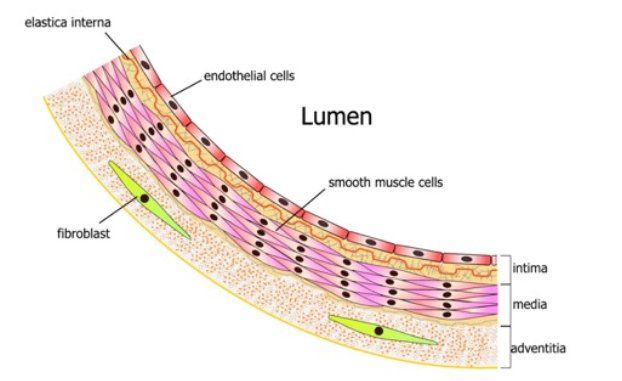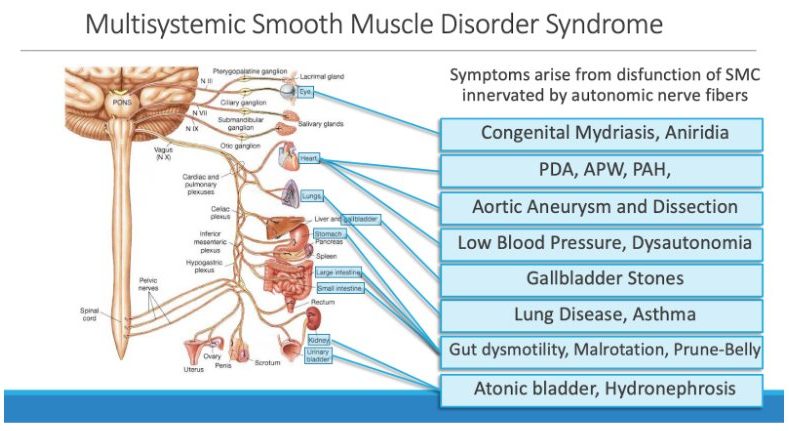Foundation for Multisystemic Smooth Muscle Disease
STAY INFORMED & UP TO DATE
Stay on top of the most current news and events!
WHAT IS MULTISYSTEMIC SMOOTH MUSCLE DYSFUNCTION SYNDROME?
WHAT IS
MULTISYSTEMIC SMOOTH MUSCLE DYSFUNCTION SYNDROME?
WHAT IS MULTISYSTEMIC SMOOTH MUSCLE DYSFUNCTION SYNDROME?
Multisystemic Smooth Muscle Dysfunction Syndrome (MSMDS) is an ultra-rare disease in which there are less than 50 known cases worldwide. MSMDS affects all of the smooth muscle in the body and is considered to be multisystemic due to its ability to affect most of the subsystems in one’s body. MSMDS is caused primarily by an ACTA2.R179H genetic mutation, however has been documented to be caused by ACTA2.R179C as well.
WHAT IS SMOOTH MUSCLE AND WHAT IS ITS FUNCTION IN THE BODY?
Smooth muscle is the type of muscle that most internal organs like the bladder, the intestines, the uterus, the lungs and the vessels of the body use. Unlike the skeletal muscle in our body that control our movement, we have little voluntary control of the smooth muscle. The smooth muscle in the uterus, for example, helps a woman to push out her baby. In the bladder, smooth muscle helps to push out urine. Smooth muscle determines the flow of blood in the arteries and the blood pressure. Smooth muscles move food through the digestive tract. In the eye, smooth muscle narrows the pupil to control the amount of light that can reach the retina in the back of the eye. In the lungs smooth muscle can narrow the airways redistributing air flow.

WHY DO ACTA2 MUTATIONS AFFECT PRIMARILY THE SMOOTH MUSCLE?
The smooth muscle is made of cells called smooth muscle cells. While every cell in the body carries the same copy of the
ACTA2
gene (code or “recipe”), only those that need to perform contraction in the organs and vessels will read the recipe of the
ACTA2 gene, gather all necessary ingredients (amino acids, i.e. argening, histidine, etc.) and make the alpha smooth muscle actin isotype 2 protein. When the recipe carries an error (a mutation), a protein with abnormal ingredients (abnormal amino acids) is made instead. This causes changes in how the protein works inside cells. Other cells of the body in charge of functions other than contraction, such as carrying oxygen (red blood cells), do not use the mutated
ACTA2 gene and therefore function normally.
WHAT HAPPENS INSIDE THE CELL WHEN ABNORMAL PROTEIN IS MADE?
Alpha Smooth Muscle Actin Isotype 2 is one of the most abundant proteins in smooth muscle cells. These proteins are tiny round proteins (G-actin) that by attaching to one another form chain “filaments” (F-actin). These chains run in parallel and when rolled against each other, they overlap and the cell shrinks (contracts). When abnormal smooth muscle proteins are in the mix, this contraction is not as effective, the cells gets stressed and symptoms appear in those organs and vessels where smooth muscle cells are abundant.

Figure 2. Relaxed Smooth Muscle vs Contracted Smooth Muscle
WHAT IS THE DIFFERENCE BETWEEN ACTA2 MUTATIONS & MULTISYSTEMIC SMOOTH MUSCLE DYSFUNCTION SYNDROME (MSMDS)?
Many mutations in the
ACTA2
gene have been found to date in patients with familial thoracic aortic aneurysms (dilatations and tears of the largest vessel in the body). Only few of them, and primarily those that change the amino acid Arginine 179 (Arg179) are associated with a more extensive form of the disease that affects the whole body.
ACTA2 Arg179 mutations impair the function of smooth muscle throughout various organs and systems of the body beyond the aorta, specifically affecting involuntary muscles found in the walls of hollow organs such as blood vessels, bladder, esophagus, stomach, and bronchioles. Other mutations in the
ACTA2 Arginine (R258 for example) can also cause MSMDS.

Figure 3. Organ Dysfunctions Reported on Patients with MSMDS
I WANT TO:
Apply For a Research Grant - Coming Soon
CONACT US:
EMAIL:
msmds@acta2alliance.org
PHONE NUMBER:
617-752-3377
MAILING ADDRESS:
ACTA2 Alliance
PO Box 1272, Gardner, MA 01440
*This content is not intended as a substitute for professional medical advice, diagnosis, or treatment. Should you require medical advice, please contact a qualified medical professional who is familiar with Multisystemic Smooth Muscle Dysfunction Syndrome.
All Rights Reserved | ACTA2 Alliance


